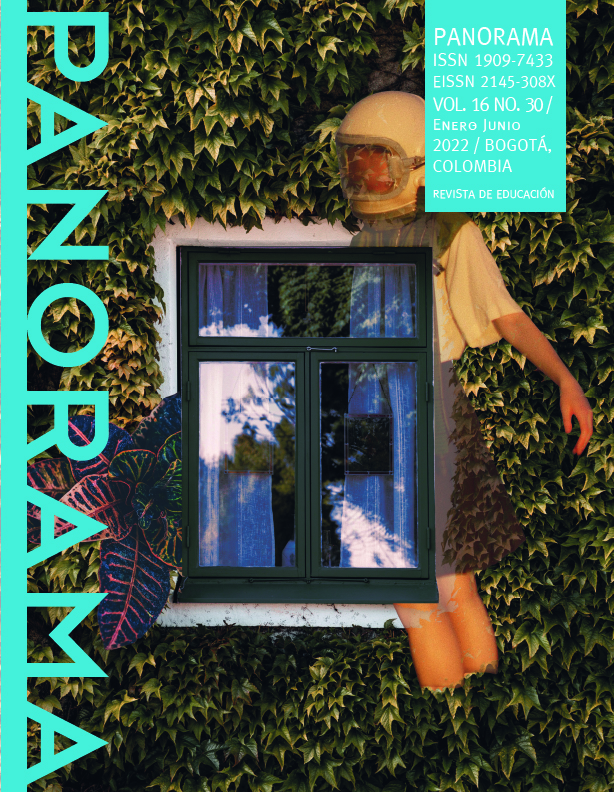Abstract
Education has been and will be conflictive. Since the memorable times of Professor Socrates, it has become what it is now: an antagonistic struggle fraught with difficulties, because there has been no approach to the meaning of being. If it has failed in the last three centuries, it is for not knowing that the Other has its own way of operating in the practices of thought and for subjecting students to oppression. The qualitative model allows us, through a documentary analysis, to build a bibliographic database to explore its meanings. These documentary data are configured as a cogito that thinks and manifests itself in real life. Traditional thinking considers that the one who teaches is right and the other lacks knowledge. So education is about filling knowledge of all human history, without the Other thinking on his own. It is believed that this action will help the subject to live life in this complicated world. Education, then, is a hopeless case. The contribution is to generate one's own knowledge of the Other based on the essence of Being. Education without this possibility is a dilemma with no way out, with a catastrophic immensity in times of pandemic, where virtuality, the digital, corners even more the cognizing entity submitted to a terrifying habitat. The pandemic became an opportunity to transform the school in post-pandemic towards a New Enlightenment, which consists in the possibility of thinking on one's own.
References
Anutrir (06 de abril de 2020). Violencia intrafamiliar en confinamiento: La doble pandemia [Página web]. Recuperado de http://anutrir.com/2020/04/violencia-intrafamiliar-en-confinamiento-la-doble-pandemia/
Bauman, Z. (2010). La globalización. México: Editorial Fondo de Cultura Económica.
Buber, M. (1997). ¿Qué es el hombre? Colombia: Editorial Fondo de Cultura Económica.
DANE (s.f). Estadísticas pobreza y condiciones de vida [Página web]. Recuperado de https://www.dane.gov.co/index.php/estadisticas-por-tema/pobreza-y-condiciones-de-vida/pobreza-y-desigualdad/pobreza-monetaria-y-multidimensional-en-colombia-2019
FAROS (13 de marzo de 2021). Los riesgos de las redes sociales en la salud mental de los adolescentes [Página web]. Recuperado de https://faros.hsjdbcn.org/es/articulo/riesgos-redes-sociales-salud-mental-adolescentes.
Fernández, E. (2019). Significado de los iconos de WhatsApp: qué quiere decir cada emoji y cómo puedes utilizarlos. En Bussines Insider. Recuperado de https://www.businessinsider.es/significado-iconos-whatsapp-quiere-decir-cada-emoji-498693
Foucault, M. (1984). Entrevista con Michel Foucault realizada por Raúl Fornet-Betancourt, Helmut Becker y Alfredo Gómez-Muller el 20 de enero de 1984. Publicada en la Revista Concordia 6 (1984) 96-116.
Foucault, M. (2010). La arqueología del saber. México: Editorial Siglo veintiuno.
Frankena, W. K. (1968). 3 filosofías de la educación en la historia. México: Editorial Fondo de Cultura Económica.
Fullat, O. (1997). Antropología filosófica de la educación. España: Editorial Ariel.
https://www.bbc.com/mundo/noticias-43032001. 2018.
Ibañez, F. (2020). Educación en línea, Virtual, a Distancia y Remota de Emergencia, ¿cuáles son sus características y diferencias? Recuperado de https://observatorio.tec.mx/edu-news/diferencias-educacion-online-virtual-a-distancia-remota.
Jaramillo, J. (1978). Historia de la pedagogía como historia de la cultura. Bogotá: Centro de investigación y educación cooperativas (CIEC).
Kant, I. (2003). El conflicto de las facultades. Madrid: Traducción de Roberto R. Aramayo. Alianza Editorial.
Kant, I. (2004). ¿Qué es la Ilustración? Madrid: Edición de Roberto R. Aramayo. Alianza Editorial
Kant, I. (2006). Crítica de la razón pura. Bogotá: Editorial Ediciones universales. Tomo I y II.
Maffesoli, M. (2001). El instante eterno. Buenos Aires: Editorial Paidós.
Neill, A. S. (1960). Summerhill: A radical approach to child rearing.
Niño, F. de J. (1998). Antropología pedagógica. Bogotá: Editorial Magisterio, 64.
Platón, (1872). La República. Obras completas. Madrid: Editorial de Patricio de Azcárate, 7.
Recuperado de https://observatorio.tec.mx/edu-news/educacion-en-tiempos-de-pandemia-covid19
Reimer, E. (1973). La escuela ha muerto. Barcelona: Editorial Barral.
Revista de Sociología de la Educación (RASE) (2020). Especial COVID-19. 13 (2)
Rodari, G. (1999). Gramática de la fantasía: introducción al arte de inventar historias. Ediciones Colihue SRL.
Vela, J. (2005). La Escritura del habla. Pasto: Universidad Mariana, 1. Cuadernos Pedagógicos.
Vela, J. (2011). Territorialidades imaginarias. Imaginarios y territorialidades mítico-urbanas de las culturas juveniles escolarizadas de la ciudad de Pasto, Colombia. Pasto: Editorial Académica Española. Recuperado de https://www.amazon.es/Territorialidades-imaginarias-Vela-Javier/dp/3844339191
Villafuerte, P. (2020). Educación en tiempos de pandemia: COVID-19 y equidad en el aprendizaje” Observatorio de Innovación Educativa,
Wakefield, J. (13 de febrero de 2018). Los preocupantes efectos negativos de las redes sociales sobre la salud mental de los niños y adolescentes. [Página web]. Recuperado de Wikipedia (s.f). Paideia. [Wiki]. Recuperado de https://es.wikipedia.org/wiki/Paide%C3%ADa ojs.uv.es/rase l ISSN: 2605-1923
Zuleta, E. (1985). La educación un campo de combate. En “Educación y Democracia: un campo de combate, Hernán y Valencia, Bogotá: Fundación Estanislao Zuleta.
Famosa frase del profesor Sócrates: “Conócete a ti mismo”.
Con esta afirmación, hago referencia al estudiante sometido al proceso pedagógico.

This work is licensed under a Creative Commons Attribution-NonCommercial-NoDerivatives 4.0 International License.
Copyright (c) 2021 Politécnico Grancolombiano






